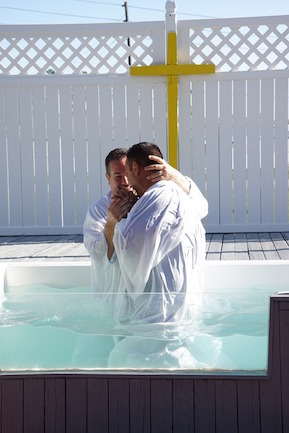When the News Is Too Much by Maria Baer for The Gospel Coalition
In 2014 tens of thousands of minority Yazidis fled to the top of Iraq’s Mount Sinjar to escape violent religious persecution at the hands of ISIS. In the weeks and months that followed the refugees’ hasty climb, aid workers and the Iraqi military dropped supplies by airplane and, in some cases, rescued children from the area.
In one photo, an Iraqi mother, her brow furrowed in panic, holds her small child up to the sky, hoping an aid worker will take him away. She might never see him again, but at least he would be safe.
The first time I saw that photograph, I was sitting in an air-conditioned office in Phoenix. I was wearing a pencil skirt, listening to the dull hum of hushed workplace conversation. I was alert, fed, caffeinated, and a little bored. I saw the photo. Then I had a panic attack.
Support Our Site

Now is your chance to support Gospel News Network.
We love helping others and believe that’s one of the reasons we are chosen as Ambassadors of the Kingdom, to serve God’s children. We look to the Greatest Commandment as our Powering force.
Grappling with the News
It wasn’t the first time it’s happened, and it wasn’t the last. Hearing stories of tragedy is difficult for everyone. For me it sometimes means I can’t breathe, or stand up, or speak without choking on tears. This has been a great source of shame for me for a long time. How can I be incapacitated by just seeing a horror that someone else is actually living?
For a while, I believed the only way to atone for this terrible sin of privilege was to force myself to look. Don’t scroll past the photo of the Syrian child with xylophone ribs. Don’t change the channel at the news of another mass shooting. Watch all the viral body-cam footage. While it may have kept me somewhat informed (at least about whatever the outlet was willing to report), this approach proved counterproductive. Though seeing the horror made me want to be part of the solution, I can’t help anyone if I’m rocking back and forth in my closet.
I’m not alone. Sussex University psychology professor Graham Davey told Time last year that, for many people, watching shocking or especially tragic news stories can lead to symptoms of “acute stress” or even PTSD.
As a follower of Jesus, I have an obligation to care for my neighbors, and I can’t do that if I don’t know who they are or what they need. I also have an obligation not to become apathetic to the seemingly bottomless ocean of needs. At the same time, I can’t be a part of any solution if I’m continuously stricken with panic attacks out of some attempt to “stay aware.” In our media age, this creates a tension the whole church has to wrestle with: How much news should we consume? And how do we consume responsibly so that it doesn’t cripple us—or worse, desensitize us?
1. Know Your Limits
For people like me, ingesting too much tragic news can interfere with our ability to function as healthy people. My body sends me flight-or-fight messages when I see disturbing photographs or videos. It’s foolish to ignore those messages; not only does it hurt me, but it also impedes my ability to help anyone.




